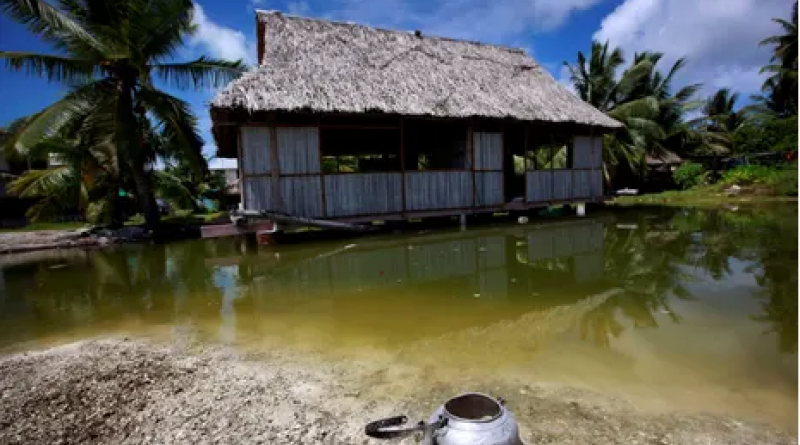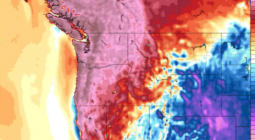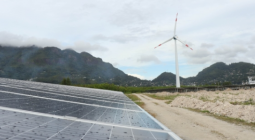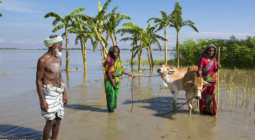Op - Australia’s commitment to coal is putting my country of Kiribati in danger

Constant change in the climate policies of Australia and New Zealand has been a huge disappointment to Pacific island nations.
When I came into office as president of Kiribati in 2003, the Intergovernmental Panel on Climate Change (IPCC) had released its third assessment report and, like my predecessors, I believed the report’s projected rise in sea levels posed a real threat to the survival for those of us on the frontline. Accordingly, in my first address at the UN General Assembly in 2004 I drew attention to the dangers posed by climate change, especially to small island nations like Kiribati and other Pacific island countries.
The fact that no other leader made any reference to it in their statement worried me and I wondered whether I might be making a fool of myself, especially when the focus of international attention at the time was on more real and present threats like terrorism. Thankfully by the next assembly, in 2005, other Pacific island leaders had joined the call for action. This has gathered great momentum in the years since.
But as the years rolled on, the fossil fuel lobby changed strategies, focusing their efforts on manipulating political leaders into making climate change into a partisan issue on which politicians could be ideologically divided.
It was therefore no surprise to hear this month, just before Cop26, that the Australian government tried to lobby the IPCC to water down the language of the latest report before its release. Today not only is the science on climate change rock-solid but countries which in the past did not regard the climate crisis as relevant to their lives are now beginning to experience unprecedented bushfires, deadly heatwaves and more powerful storms, among other effects.
This is incontrovertible evidence on the ground that the climate crisis is indeed global in nature and no longer a distant reality. Pacific leaders have, over the past two decades, consistently drawn attention to the existential threats faced by our people, but especially those in the low lying atoll islands from climate change. Now it is becoming increasingly clear that unless we as a global community can collectively rally to radically reduce our emissions, the future existence of all humanity on this planet is at risk.
The Pacific region, with the largest number of vulnerable island nations most at risk, has consistently been at the forefront of the campaign on climate change and the political and community leaders of the Pacific islands can be credited for much of the progress made in multilateral climate negotiations.
The one weakness in the force of our campaign has been the lack of unity with the larger members of our Pacific family. It has been a huge source of disappointment for us to witness the constant changes of climate policies with the eddies of political parties in power, in both Australia and New Zealand. It has always been, and continues to be, our hope that Australia – with its higher international profile – would provide us and the international community with the leadership we need on an issue of such critical importance to our people, our Pacific family.
The withdrawal of Australia’s support to climate financing through suspending its contributions to the Green Climate Fund was a huge blow to our expectations of building much needed climate resilience here in the Pacific islands. The additional $500m in bilateral aid committed by prime minister Scott Morrison at the Cop26 Summit this week, while a welcome increase, falls far short of what is required for building Pacific climate resilience.
But, worse still, is the Australian government’s continued commitment to extracting, burning and exporting the coal and gas that is putting my country in direct climate danger.
The recent announcement by Morrison, on the evening of his departure for Cop26, of his government’s revised climate policy does not indicate a change of position on climate financing nor does its emission targets reflect a genuine or meaningful contribution to addressing this existential threat. Australia has not made any changes to its weak 2030 emissions reduction target and remains well short of the commitments made by other members of the G20.
The burning question is: “With all of the science available to us today and with all of what we are witnessing happening in different parts of the world, why do we still not take the action needed to avoid the projected cataclysmic end to humanity?”
Australia can and must be bolder on climate action, through strengthening its emissions reduction targets and increasing its climate finance contributions. Pacific peoples and Australians alike, as part of a Pacific family, depend on it.
-
The Rt. Hon. Anote Tong is a former president of the Republic of Kiribati
7 November 2021
The Guardian




